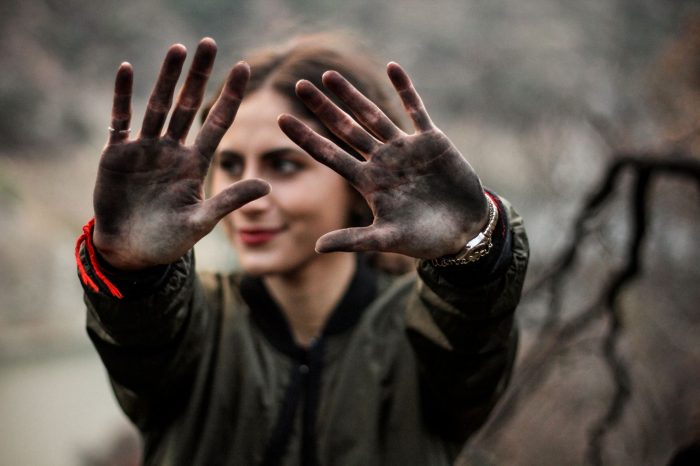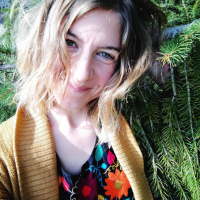I sat on a rock by the creek this morning as the wind whipped and pulled the remaining leaves from the fingers of trees.
The wind deposited birch, aspen, and beech leaves in final resting piles on the ground or soggy heaps in the water. I watched a few fall like paper boats tipped upward, gently compelled downstream, in spite of the many obstacles.
Chickadees and Juncos bobbed, hopped, and flew in and out of limbs, their voices punctuating the wind, the rustling leaves, the burbling water.
And just like that, the tears were trailing down my cheeks the way gravity pulls the creek’s water down the hillside.
All it takes is a few moments of this immersion for the love that sits like an ache against my chest to rise again: I want a better world for all of you.
I welcome these tears every time, for they remind me why I’m here. I breathe it all in, this medicine of the natural world, and carry it back with me as a bridge to my daily work.
It’s not always easy to bridge these worlds, to connect their medicines—outer and inner, magical and mundane, future vision and present reality—but knowing my why is the link between it all.
On my working days, I spend close to eight hours mucking stalls for a flock of rescued ducks. Every day, it’s essentially the same routine for each stall: scrape poop, empty and scrub bowls, remove soiled hay, rotate and fluff hay, add fresh hay, fill water bowls, return the ducks, secure the enclosure, move onto the next.
I am called a duck caretaker, but in the eyes of the ducks, I’m probably nothing more than a glorified maid—and I’m okay with that arrangement.
Sometimes, I pause and watch them floating in a rubber tub, dipping their heads and shaking their feathers before preening. I think about the kind of life they had before rescue, a perpetual state of fight-or-flight, without a sense of security or shelter from predators.
Here at SHO Farm, they are meticulously cared for, seen, and valued as the individuals they are, worthy of lives of their own rather than treated as expendable commodities.
I remind myself of this when my elbows are streaked in their feces or my back aches or they’re flying in and out of their pens to test me as the newbie.
I’m not here as a cog in a machine; I’m here because I want to be a wrench in the whole damn system. Or, as Dietrich Bonhoeffer once said:
“We are not to simply bandage the wounds of victims beneath the wheels of injustice; we are to drive a spoke into the wheel itself.”
I’m here because caring for these ducks plays an integral part of the mission of this vegan farm. We are problem-solving firsthand how to move beyond a typical animal sanctuary model, beyond agricultural farming, to a fully regenerative and self-supporting model of farming with rescued animal partners.
As ethical vegans, we are finding ways to connect the dots of forest management, land and wildlife conservation, regenerative farming, environmental stewardship, and animal rescue.
It’s a big vision with numerous complex pieces. It can be easy to forget how cleaning duck poop contributes to its overall success.
I haven’t been here long, but I continually remind myself because I don’t want to forget: it’s a privilege to do this work. It matters.
In a world where so many things are effed up, this is one way I can roll up my sleeves and focus my energies on making it better for all the ones I love.
Not everyone is a stall-mucker for ducks, and that’s not the point. The point is, we all have our equivalent of less-than-glamorous tasks. We do not all, however, have the same why for these tasks.
I’m inviting you to get curious, get soul-level honest, about your why.
Is there a connection between the ache in your chest and the work that you do? If not, might there be a way they partner together that you aren’t aware of yet?
Take, for instance, the mom or dad who is exhausted from the extra cooking and cleaning chores from months of sheltering-at-home living. There is nothing glamorous in scrubbing dishes, doing laundry, or preparing meal after meal in a time pinch.
But scale back.
What kind of world do you want for your kids? What kind of people would you like to see them become?
In these mundane acts, these shared moments, there are opportunities stashed like seeds waiting to be planted. The larger conversations we can have as we share meals; the mindful attention that goes into what we eat, no matter how simple it may be; the practice of gratitude; the sharing of responsibilities as a family. These things have their own medicine.
Maybe there is no connection between that ache and your why, and the question becomes, “Is this something I can change?”
How can you invite curiosity, openness, and lack of judgment into this space?
This is not to say that we’re all going to be employed doing work that actively connects us with the why that matters most to us. But it doesn’t have to be paid work.
Before I was a duck caretaker, my go-to work to connect my outer and inner worlds that gave me a sense of agency was picking up litter from wild ecosystems.
When everything else felt outside my control, this was one thing I could do to remind me of my power. I couldn’t do so many things, but I could do this. And while it wasn’t much, and it wasn’t grand or glamorous, it was deeply connected to my why: I want to leave this world a little better than how I found it.
Somewhere, stashed in these mundane tasks, is a medicine that strengthens our spirits. Sometimes we just need to get quiet, get curious, and ask different questions.
Like the leaf falling on the water, let yourself be pulled downstream and see where the questions take you.
~









Read 40 comments and reply